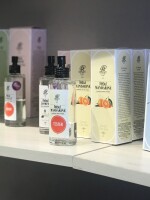ROBERT SIEGEL, HOST:
After two days of nuclear talks with his Iranian counterpart, Secretary of State John Kerry is returning to Washington. Sunday is the deadline for a deal to limit Iran's nuclear program in exchange for lifting economic sanctions. NPR's Peter Kenyon reports from Vienna that the talks could be extended.
PETER KENYON, BYLINE: Amid crises unfolding around the Middle East, Kerry took time to focus on the Iran nuclear talks as they near a July 20th deadline. Shortly before leaving Vienna, Kerry told reporters that he'll talk to the president about how to proceed if an agreement can't be reached by then, a signal that a deal may not be ready by Sunday. Kerry also responded to some mixed signals from Iran on a major sticking point - Iran's ability to enrich its own nuclear fuel, uranium. Last week, Iran's supreme leader, Ayatollah Ali Khamenei, said Iran would need nearly 200,000 centrifuges processing fuel in the future - a nightmare scenario for those who fear Iran could someday make a dash for a nuclear weapon. Then, Iran's foreign minister, Mohammad Javad Zarif, suggested that Tehran is prepared to essentially hold its uranium enrichment at current levels for several years. While not a breakthrough, it would be an important concession at a crucial moment in the talks. Kerry said Iran's current total of 19,000 centrifuges is too many, but a way forward is still possible if Iran is willing to prove that it's abiding by the Nuclear Non-Proliferation Treaty, as it claims.
(SOUNDBITE OF ARCHIVED RECORDING)
JOHN KERRY: I want the supreme leader to know the United States believes that Iran has right to have a peaceful nuclear program under Article IV of the NPT. There's no question about that. And what we are now working on is, how do you guarantee that what they do have is, in fact, purely peaceful?
KENYON: Zarif came before reporters to make Iran's case. The veteran diplomat has been here before. Experts say a decade ago, he offered essentially the same deal - to limit Iran's enrichment to a few thousand centrifuges with a possibility of expanding later - a proposal that was rejected by the West. Now the numbers are higher, but the offer appears to be generally the same - some limits now, with more freedom to enrich later. Zarif says any deal must be based on respect, which means respecting Iran's choice to enrich its own uranium so long as it's for peaceful uses only.
(SOUNDBITE OF ARCHIVED RECORDING)
MOHAMMAD JAVAD ZARIF: We insist on having a serious, transparent and internationally monitored, peaceful nuclear program, including, serious and not symbolic enrichment.
KENYON: Iran wants enough fuel for its Bushehr reactor. That sends off alarm bells among those who worry that a program that large could enrich enough weapons-grade fuel for a bomb in a relatively short time. Kerry says the world needs absolute assurances that won't happen. But Zarif says mistrust goes both ways. Iran, for instance, tried buying its reactor fuel from outside sources in the past and got burned when deals fell through.
ZARIF: You cannot expect Iran to trust the international market because the international market has betrayed us. Had it not been for the betrayal of the international market, we never needed to produce fuel.
KENYON: Both Zarif and Kerry are now signaling that the sides may need to extend these talks beyond July 20. Zarif says there's a built-in second deadline in the interim accord signed last fall - November 23. Between now and then, analysts say, the political atmosphere in both Tehran and Washington could grow more hostile to a deal. So if there is to be an extension, it should be as short as possible. Peter Kenyon. NPR News, Vienna.
AUSIE CORNISH, HOST:
You're listening to ALL THINGS CONSIDERED from NPR News. Transcript provided by NPR, Copyright NPR.


